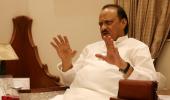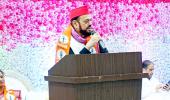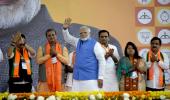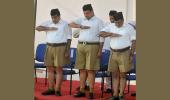Voters, it is said, get the government they deserve. On November 23, we will see what voters in Maharashtra choose. Till then, a sense of helplessness and scepticism hangs in the air, notes Ramesh Menon.

Preparations for the assembly elections in Maharashtra amply demonstrated the putrefying political culture in the state, as there are no genuine issues that any party is fighting for.
It is about the raw jockeying for power.
It is about polarising voters and dividing them on caste and communal lines.
It is about offering freebies to bribe voters.
Electoral discourse has plummeted to an all-time low.
Every party has its share of rebels contesting who will cut the vote share and upset calculations.
Electoral debate on governance is almost not there as parties ride on a mediocre campaign making allegations against each other.
The last five years have seen less governance and more politics, horse trading, scepticism among the populace, and petty issues dominating centre stage.
It is a sad commentary for India's second-largest state, with the largest economy housing its financial capital.
There is a cloak of uncertainty as those who were voted out in the last assembly elections were sitting in the Opposition and rode to power overnight.
Allegations of horse trading soon died a natural death as scepticism haunts the electorate.
It is a messy picture. Voters wonder whom to vote for as politicians they voted for or against switched parties and alliances to grab power.
They turned out to be strange bedfellows. Ideology was only talked of in the past tense.
On October 24, 2019, the Bharatiya Janata Party and the Shiv Sena had the majority to form a government but deciding about who should be the chief minister took more than a month.
Finally, on November 29, Udhav Thackeray was sworn as chief minister, the Shiv Sena dumping its long-time ally the BJP and forming an alliance with the Congress and the Nationalist Congress Party.
In June 2022, the Shiv Sena split with rebel Eknath Shinde, taking away a majority of MLAs to tie up with the BJP and, later, with a breakaway faction of the NCP.
Shinde had less MLAs than the BJP, but cleverly bargained to muscle himself to becoming the chief minister with Devendra Fadnavis and Ajit Pawar of the NCP becoming deputy chief ministers.
It seemed like a BJP masterstroke splitting two major regional parties that once ruled the state.
The writing on the wall was there for all to see. The lust for power was just too evident.

For the last 30 years, Maharashtra has been cursed with coalitions that have compromised and adjusted to stay in power.
In the last five years, the state has seen three chief ministers and two major regional parties splitting in the last five years.
It has witnessed the strangest political alignments bereft of all ideology other than clinging to power.
Here is a state with fantastic potential to be the number one state in India in every sense. It could have been a model state for others to copy and follow.
However, narrow politics destroyed that eventuality.
It is the second most industrialised state but could easily have been number one. It helplessly witnessed the flight of capital to neighbouring Gujarat.
It could also have simultaneously emerged as a significant agricultural economy, something no other state could have rivalled. But narrow, unstable politics ridden with caste has played truant.
Today, no party is in a position to get a majority, and a coalition of more than two major parties has to be forged to get to any winning position.
No one wants to predict who will win, as no one knows how the confused voter will turn.

Days before the Model Code of Conduct could kick in, Shinde unleashed a host of welfare schemes that would cost the exchequer Rs. 90,000 crore (Rs 900 billion).
The hurry was evident as the Shinde-led Mahayuti government, a coalition of the BJP, Shiv Sena and NCP, took 146 decisions in around 30 days.
Most of them were populist, like granting the indigenous cow the status of Rajmata Gaumata and creating corporations for minorities and different castes and communal groups.
Targeting women, the Mukhyamantri Mahi Ladki-Bahin Yojana, a scheme that promises a cash transfer of Rs 1,500 to poor women aged between 21 and 65 with an annual family income of less than Rs 2.5 lakh.
There are 70,000 such beneficiaries in each constituency. Around 25 million women are estimated to be eligible to get this monthly dole.
Shinde's idea will seriously strain the exchequer, which is already very strained due to populist schemes and poor governance.It is estimated to cost around Rs 46,000 crore (Rs 460 billion).
But it might get his coalition votes, and that is worrying the Maha Vikas Aghadi, a conglomerate of the Shiv Sena (Udhav Balasaheb Thackeray), the Congress and the National Congress Party (Sharatchandra Pawar).
Of the ten seats the NCP (SCP) contested in the last Lok Sabha elections, it won eight.
The NCP, led by Ajit Pawar, won just a solitary seat. Even his wife Sunetra Pawar, who contested from Baramati, lost.
This time around, Ajit Pawar contesting from Baramati faces Yugendra Pawar, his nephew, fielded by the NCP (SCP).

Ajit Pawar will face political oblivion if his faction does badly. Those with him today will gladly return to the Sharad Pawar-led party, if the wind blows towards it.
What distinguishes this election is the reality of how all the erstwhile powerful parties are fighting for survival.
None can afford to lose, as it will significantly impact its future.
Shinde has to win big to stay as chief minister. He also has to keep his flock together, ensure no erosion of his party happens, and retain the original name and election symbol.
He is no pushover, as Fadnavis and Ajit Pawar have realised. When he took over, the rumour was that he would be a puppet and strings would be pulled from Delhi by the two obvious BJP strongmen.
But he came into his own, making independent decisions and showing that his humble background as a rickshaw driver was not a hindrance.
Sharad Pawar has always been a master player and is known to be a wily politician who can surprise. This time he, too, is fighting to save the party he founded -- something he never imagined.
Uddhav Thackeray is desperate to prove that he leads the real Shiv Sena founded by father Balasaheb Thackeray. He is banking on the sympathy factor again, stressing how Shinde was a traitor who crossed over to split Balasaheb Thackeray's party, hoping the faithful would rally around him.
The Congress, led by Nana Patole, wants to show that Haryana was a fluke and that it is still the most prominent contender against the BJP. But it does not have a cadre like the BJP to work as stormtroopers on the ground.
The BJP, which rules a majority of states in India, wants to clinch Maharashtra more than ever, as it will impact the coming state elections in Delhi and Bihar.
Delhi is a prestigious contest, and the BJP has not been able to unseat the Aam Aadmi Party in the last ten years.
In Bihar, it wants to show that Nitesh Kumar of the Janata Dal-United is a spent force and win enough seats to have its chief minister.
The BJP is worried that the Marathas might again vote against it, as their demand for being included in the other backward castes and being granted reservations has not happened.
Marathas constitute 12 to 16 per cent of the population, and Marathwada has 104 seats. The agrarian crisis may also hurt the BJP in areas like Vidarbha.
In Haryana, the RSS micromanaged the assembly election as the BJP was up against a resurgent Congress. They will do the same in Maharashtra, which is their home turf,

What would the new legislative body look like? The previous assembly was punctuated by political turmoil, charges of horse-trading, and poor governance.
Fifty-three MLAs managed to become ministers in various governments that changed one after the other.
The speaker's chair was empty for over a year. On an average, the assembly met for 27 days a year.
Seventy percent of bills were passed in less than five days. None of the 20 private member bills introduced were ever discussed.
Voters, it is said, get the government they deserve. On Saturday, November 23, 2024, we will see what voters in Maharashtra choose. Till then, a sense of helplessness and scepticism hangs in the air.
Ramesh Menon, award-winning journalist, educator, documentary film-maker and corporate trainer, is the author of Modi Demystified: The Making Of A Prime Minister.
Feature Presentation: Aslam Hunani/Rediff.com











 © 2025
© 2025